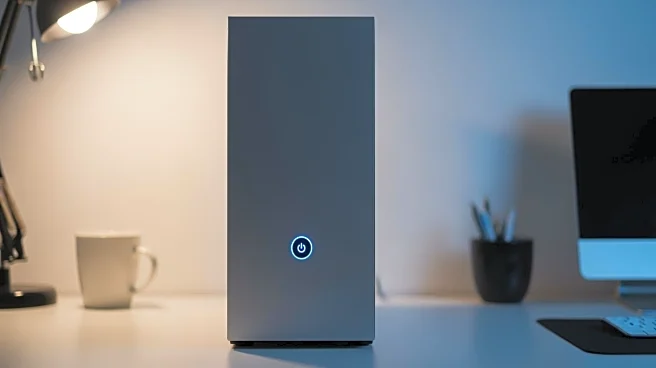What's Happening?
Dell has significantly reduced the price of its OptiPlex 7020 Mini PC by 71%, bringing the cost down from $3,399 to $996. This desktop PC, slightly larger than typical mini PCs but smaller than full-sized
towers, is equipped with a 14th-gen Intel Core i7-14700T processor, 32GB of RAM, and a 1TB hard drive. It supports up to three 4K displays and includes multiple ports for connectivity, such as HDMI, DisplayPort, USB-C, and USB-A. The OptiPlex 7020 is designed for high performance, running Windows 11 Professional and featuring Intel UHD Graphics 770. Its compact size allows for easy portability and space-saving efficiency, making it suitable for mounting behind monitors.
Why It's Important?
The substantial price reduction of the Dell OptiPlex 7020 Mini PC makes high-performance computing more accessible to a broader range of consumers. This move could potentially increase Dell's market share in the desktop PC segment, particularly among users seeking powerful yet compact computing solutions. The enhanced affordability may also drive competition among PC manufacturers, prompting further innovation and price adjustments in the industry. Consumers benefit from the ability to purchase a high-quality, versatile PC at a fraction of its original cost, which could influence purchasing decisions and boost sales.
What's Next?
With the OptiPlex 7020 now available at a significantly lower price, Dell may experience increased demand for this model, potentially leading to stock shortages or extended delivery times. Other PC manufacturers might respond by offering similar discounts or introducing new models to compete with Dell's offering. Additionally, Dell could leverage this pricing strategy to promote other products in its lineup, further expanding its customer base. The success of this discount could influence future pricing strategies and product development within the company.
Beyond the Headlines
The discount on the OptiPlex 7020 Mini PC highlights the growing trend towards compact and efficient computing solutions. As consumers increasingly prioritize space-saving and portable devices, manufacturers may focus on developing smaller, more powerful PCs. This shift could lead to advancements in technology, such as improved processors and graphics capabilities, tailored to meet the demands of modern users. The emphasis on affordability and performance may also drive innovation in other areas, such as energy efficiency and sustainable manufacturing practices.









